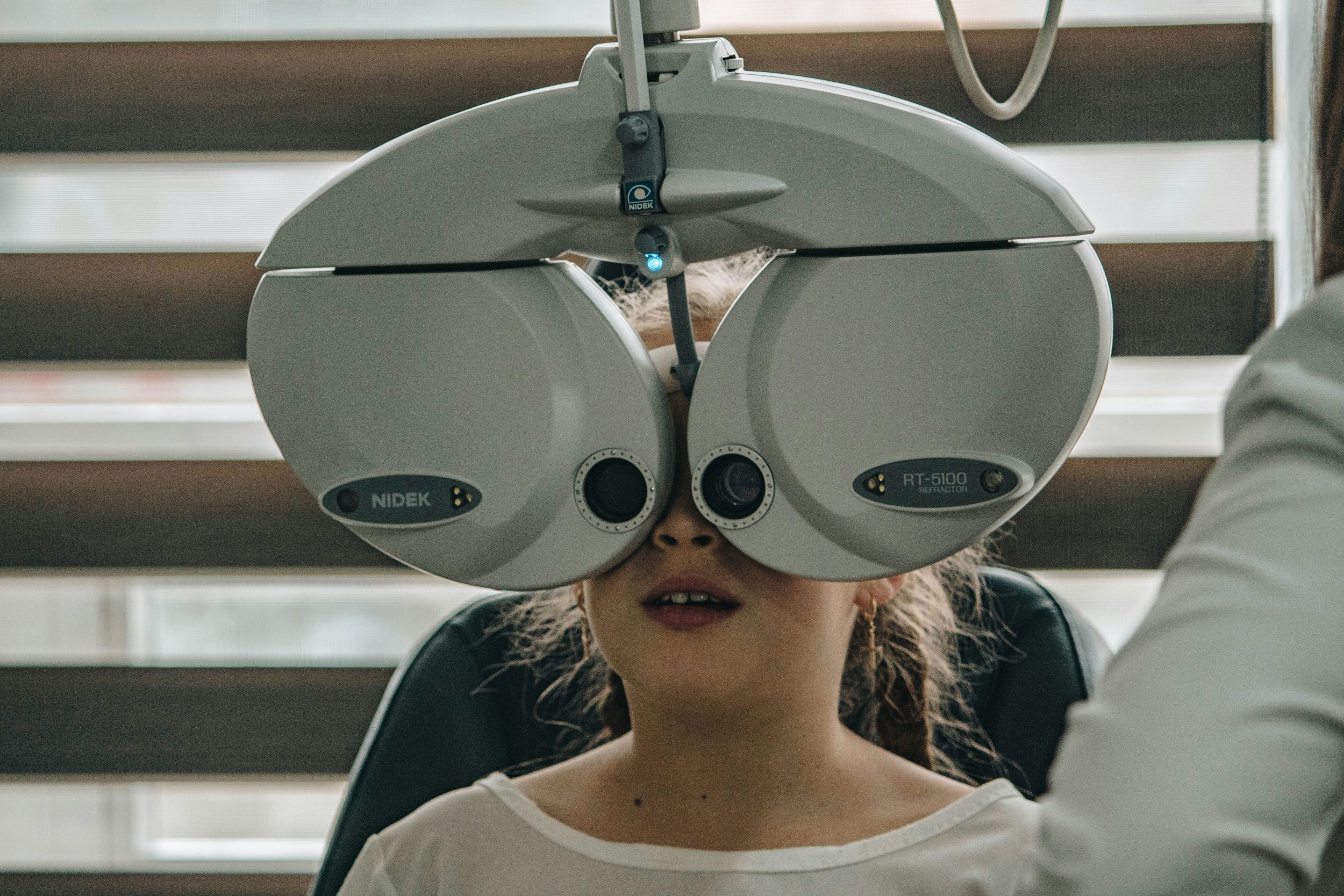Vision loss, whether mild or severe, can be a great source of stress and strain to a person’s physical and mental well-being. In the US alone, over 7 million individuals are visually impaired, and 1 million of those people are legally blind.1 An additional 93 million American people are at risk for severe vision loss, and numbers are seemingly on the rise. Experiencing vision loss can be a very unsettling experience, and it is something that can negatively affect so many areas of a person’s life. So many liberties that we may take for granted become strenuous — being able to drive, cook, clean, work independently, watch TV, and so many other tasks become difficult. All in all, vision issues are deeply impactful to those who suffer from them, and this can lead to serious mental health issues such as depression and anxiety. In this blog, we will delve deeper into the effects of vision loss and impairment, and how it can negatively impact a person’s mental health.
Statistics: Who is most likely to experience vision loss?
Being able to see clearly is something that so many people expect to always have. Unfortunately, vision loss and poor eyesight is quite common in our society. Aging plays a large role in rising levels of vision loss, and individuals over the age of 50 are most likely to experience vision-related problems.2 Vision impairments, such as blindness, are one of the major causes of loss of independence for U.S. adults over the age of 65, and costs related to vision loss cost the U.S. about $40 billion per year.2 In addition, since 2012 over 4.2 million people in America aged 40 years or older suffer from uncorrectable vision issues, and this number is projected to increase 2-fold by 2050 to 8.96 million individuals because of an increase of chronic conditions such as diabetes.3 While the number of people who experience vision impairment naturally rise in part to aging, the National Institute for Occupational Safety and Health report that approximately 2,000 U.S. workers experience job-related eye injuries that require medical intervention every single day. However, even with such high rates of vision issues, only half of the 93 million American adults who have risks of serious vision loss have seen an eye doctor within the last year.
Adults are not the only people affected by vision loss, as approximately 6.8% of children under the age of 18 in the US have a diagnosed eye or vision condition. Almost 3% of children under the age of 18 years old are blind or have vision impairments, meaning that they struggle to see even when corrected with glasses or contact lenses.3 Overall, vision disability falls in the top 10 disabilities for adults over the age of 18 years old and is also one of the most prevalent, disabling conditions for children in America.
Vision impairment can lead to mental health issues
Life is complicated enough, but struggling to see clearly can make things even more difficult. Daily tasks, leisure activities, and even recognizing others can be compromised with vision impairments. These struggles may lead individuals to withdraw from those closest to them, exacerbating anxious and depressive feelings. Vision impairment can cause an individual a significant amount of social and economic strife, including disability, diminished life quality, and a loss of productivity. Research has shown that people with vision loss experience a much higher prevalence of mental health issues such as depression and anxiety. In the U.S., adults with vision loss are 2-3x more likely to have depression compared to individuals who do not have vision loss.4
Depression
Individuals who experience vision loss later in life may not be able to do things and take care of themselves in the ways they once were able to, and this can cause a lot of shame, disorientation, sadness, and frustration. Having to make changes to how things have always been done can cause an individual to experience a lost sense of self or shift in personal identity. What makes these changes even more challenging is that most people with vision loss do not receive the proper support to help them cope with their new realities. Research shows that people are more fearful of experiencing vision loss compared to loss of any other sense, and when people do experience vision issues it can be a great source of emotional distress and even depression.5
On the other hand, research has also suggested that there may be a bidirectional relationship between depression and vision disability, in which depression can lead to vision issues and vision issues can lead to depression. A meta-analysis conducted showed that vision loss is one of the most common chronic conditions associated with depression in later life.6 Individuals who experience vision loss may not be able to do essential tasks such as reading a label for a medication, writing checks, recognizing loved ones, or driving a car. These daily physical limitations pose a risk for people to develop depression.6 In addition, research also shows that other eye-related diseases such as age-related macular degeneration, glaucoma, and dry-eye disease are also associated with an elevated risk of depression.6
Anxiety
According to the CDC, 1 in 4 adults with vision issues reported feeling anxiety or depression. Additionally, young adults with vision impairments were 5x more likely to develop anxiety and depression compared to adults over the age of 65.1 Individuals with vision impairments and blindness also report feeling unhappy, lonely, and sometimes even hopeless due to their condition.6 This can be attributed to the loss of independence that one feels after having to make very difficult adjustments to new life circumstances. People may feel a sense of panic and loneliness as they have to come to terms with the fact that they no longer can do things that were once easy or accessible to them. Experiencing vision loss can also induce anxiety as individuals are more prone to experiencing unintentional injuries. Losing the ability to see clearly can result in a loss of self-confidence as one learns how to navigate through the same life in a very different lens. Compromised vision can make the smallest things difficult, such as reading a dinner menu, walking around the house, and many other everyday activities. This can cause individuals to panic and feel a sense of dread when trying to adjust to new situations. Unfortunately, there is a shortage of healthcare professionals who are specifically trained to counsel those with vision loss, and a lot of the time, people with vision loss are not referred to professionals who can treat both the emotional and physical shifts they may be experiencing.4,6
Something else to note is that there are different types of vision loss that may cause different types of anxiety depending on the condition. Some folks experience more gradual vision loss, and this is usually accompanied by more anticipatory grief and anxiety. Some others may experience a serious, life-threatening injury that leads to sudden vision loss, and the anxiety and trauma that is associated with this type of vision loss is differently treated than the first.
How can stress cause vision issues?
Research has shown that undergoing mental stress can negatively affect one’s eyes and can even put one at risk for developing vision-compromising eye diseases. How?
When our bodies undergo any type of stress, our brain perceives this ‘threat’ and releases cortisol.7 Cortisol is our body’s primary stress hormone that is responsible for turning on the ‘fight-or-flight’ response. This response is meant to physically prepare our bodies to fight or run away from a potential threat, whether that be an animal or anything else. In a more modern context, much of the stress that people experience may be work or school related, and the physiological reactions our bodies undergo can affect our eye and vision health over time. When a person undergoes chronic stress, the ‘fight-or-flight’ response affects the human visual system which manifests into eye strain or headaches. Over time, chronic stress can cause a build up of pressure in the eyes, and this can lead to more serious ocular issues such as optic nerve damage or glaucoma. Research points out that stress can increase the risk of vision loss from a number of different eye conditions such as glaucoma, diabetic retinopathy, optic neuropathy, and others.
Some common stress-related vision issues include:
- Headaches
- Eye twitching
- Dry eye
- sensitivity to bright light
- Excessive teariness
- Eye strain
- Eye floaters
Even more relevant to individuals who work from home or study on a computer, a vision condition called near point visual stress (NPVS) can affect those who use computers or other technology for a significant portion of their day.7 NPVS occurs when the visual system has a difficult time undergoing continuous near-vision focusing due to an excessive amount of reading or computer use that places a lot of strain on the eyes. NPVS can lead to headaches, eye strain, and eye fatigue after excessive screen or reading time. This can trigger the ‘fight-or-flight’ response which may eventually turn into vision, behavioral, and attentional issues.
Treatment
The development of vision issues can be varied, with some individuals experiencing gradual loss and others with more sporadic, severe forms of impairment. Stress can be the cause for developing eye issues, and sometimes prescribed medication for anxiety or depression can cause an individual to experience vision issues. Whatever the stage of visual impairment one may be at, it is good to keep in mind that many causes for vision loss are treatable and even preventable. Regular eye care and routine follow-ups with eye care specialists and professionals can reduce the progression of various eye disorders, and correct lenses such as glasses or contacts can be very beneficial to those who are suffering from the limiting effects of poor vision.
References:
-
https://www.cdc.gov/visionhealth/resources/features/vision-loss-mental-health.html#:~:text=Vision%20loss%20can%20affect%20your%20physical%20health%20by%20increasing%20your,worry%2C%20anxiety%2C%20and%20fear.
-
https://hpi.georgetown.edu/visual/#:~:text=Almost%2020%20million%20Americans%20%E2%80%94%208,people%20age%2065%20and%20older.
-
https://www.cdc.gov/visionhealth/basics/ced/fastfacts.htm
-
https://preventblindness.org/wp-content/uploads/2023/05/Mental-Health-Issue-BriefF.pdf
-
https://www.ncbi.nlm.nih.gov/pmc/articles/PMC8267375/
-
https://www.ncbi.nlm.nih.gov/pmc/articles/PMC3772677/#:~:text=A%20meta%2Danalysis9%20has,has%20not%20been%20well%20studied.
-
https://www.optometrists.org/general-practice-optometry/guide-to-eye-conditions/guide-to-blurry-vision-and-headaches/treatments-for-stress-related-vision-problems/







